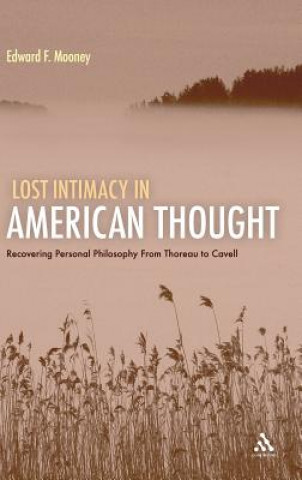
Dostawa
Doradca ds. zakupów
16 125 881 książek w 175 językach







Pokaż wszystkie języki (175)





Jednak się nie przyda? Nic nie szkodzi! U nas możesz zwrócić towar do 30 dni
 Bon prezentowy
O dowolnej wartości
Bon prezentowy
O dowolnej wartości
Bon prezentowy to zawsze dobry pomysł. Obdarowany może za bon prezentowy wybrać cokolwiek z naszej oferty.
Lost Intimacy in American Thought
 Angielski
Angielski
 578 b
578 b
30 dni na zwrot towaru
Mogłoby Cię także zainteresować


This title offers a critique of rationalism in contemporary American thought by recovering a lost tradition of intimacy in the writings of Thoreau, Bugbee, James, Arendt, Dickinson, Fuller, Wilshire and Cavell. "The Loss of Intimacy in American Thought" focuses on a number of American philosophers whose work overlaps the religious and the literary. Henry David Thoreau, Henry Bugbee, Hannah Arendt, Bruce Wilshire and Stanley Cavell are included, as well as Henry James, whose novels are treated as presenting an implicit moral philosophy. The chapters are linked by a concern for lost intimacy with the natural world and others. The early Marx would see this as the alienations in industrial societies of persons from nature, from the processes of work, from each other, and from themselves. Weber might call it the disenchantment of the world. In any case, it is a condition that forms a focus of concern for Thoreau, Bugbee, Arendt, Cavell and Wilshire as well as writers such Henry James, Dickinson and Margaret Fuller. These writers hold out a hope for closing the gaps that sustain alienations of multiple sorts and Mooney brings them into critical discourse with the secularised and constricted rationalism of contemporary analytic philosophy. The latter exalts 'objectivity' and encourages the approach that one should adopt a third person view on everything, dividing the world into rigid binary oppositions: self/other; mind/matter; human/animal; religious/secular; fact/value; rational/irrational; and, enlightened/indigenous. By contrast, each of the thinkers that Mooney discusses see writing as a way of saving the object of attention from neglect or misplaced appropriation, outright attack, or occlusion. His aim is to recognise the importance of non-argumentative forms of address in these American thinkers. The method he employs is analysis of particular texts and passages that exhibit a generous, often poetic or lyrical discernment of worth in the world. It is not meant to be an exhaustive treatment of any one thinker or theme, but a set of case studies, as it were, or a set of particular explorations, each self-sufficient yet resonating with its companion pieces. Mooney's objective is to spark interest in those who are ready to recover Thoreau and Emerson and Bugbee for the sort of American tradition that Cavell has sought to discover and rejuvenate; the tradition, as Mooney puts it, of 'American Intimates'.
Informacje o książce
 Angielski
Angielski




 Jak kupować
Jak kupować













